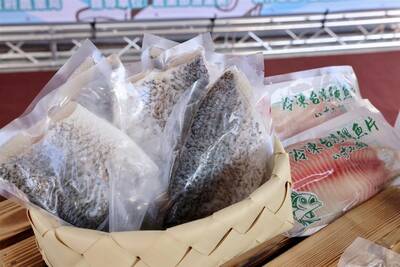The legislature yesterday postponed deliberation of a special budget bill that would allow the government to allocate up to NT$410 billion (US$14.17 billion) to invest in the nation’s security and mitigate the potential impact of US President Donald Trump’s “reciprocal” tariffs.
Chinese Nationalist Party (KMT) Legislator Wang Hung-wei (王鴻薇) said the KMT caucus and the Taiwan People’s Party (TPP) caucus had agreed to put the bill on hold pending the outcome of tariff negotiations between Taiwan and the US.
“[We should] wait until the tariff negotiations yield an outcome and consult broadly with industries for their impact assessment before deciding how to proceed [with the bill],” Wang said.

Photo: Tu Chien-jung, Taipei Times
The KMT and the TPP, which together hold a majority in the legislature, later secured the ruling Democratic Progressive Party’s agreement at a meeting on the legislative floor, thereby preventing the bill from being put to a vote until next week.
The tariffs pledged by Trump against more than 170 nations have been paused for 90 days until Wednesday next week. Trump has said Washington would begin notifying countries of the tariff rates they face yesterday.
KMT caucus secretary-general Wang expressed concern that Taiwan would receive treatment similar to Vietnam, with severe economic consequences.
Trump announced earlier this week that the US had reached an agreement with Vietnam.
Under the deal, goods sent from Vietnam to the US would face a 20 percent levy, down from the originally proposed 46 percent, while US products would be allowed to enter Vietnam tariff free.
The bill, originally designed to help Taiwanese exporters absorb potential tariff shocks, has grown from NT$88 billion to NT$410 billion, and includes NT$150 billion for military and coast guard system upgrades, and NT$100 billion in aid for financially struggling Taiwan Power Co.
The bill has drawn criticism from the opposition, which argued that much of the proposed spending is unrelated to tariff relief.
The KMT and the TPP have each submitted separate versions of the bill alongside the proposal put forward by the Executive Yuan in late April, proposing universal cash payments of NT$10,000 and NT$6,000 respectively, drawn from surplus tax revenue.
The Office of Trade Negotiations said that Taiwanese officials and their counterparts in the US completed a second round of tariff talks at the end of last month.
However, it provided little detail about the negotiations, saying only that both sides had achieved “constructive progress.”
Separately yesterday, labor groups criticized the government for “backroom dealing” and warned that they would rally outside the Executive Yuan if their right to work is compromised.
The government has not discussed the issue with labor groups, a group formed last month to deal with the impact brought by the US tariffs said in a statement yesterday.
The group criticized the government for “pretending everything is well,” and not mentioning warnings that the US could impose a 15 to 20 percent tarif.
The government has to make concrete promises and formulate complementary measures, the group said.

Taiwan's Vice President Hsiao Bi-khim (蕭美琴) said Saturday that she would not be intimidated by the Chinese Communist Party (CCP), following reports that Chinese agents planned to ram her car during a visit to the Czech Republic last year. "I had a great visit to Prague & thank the Czech authorities for their hospitality & ensuring my safety," Hsiao said on social media platform X. "The CCP's unlawful activities will NOT intimidate me from voicing Taiwan's interests in the international community," she wrote. Hsiao visited the Czech Republic on March 18 last year as vice president-elect and met with Czech Senate leadership, including

There have been clear signs of Chinese Communist Party (CCP) attempts to interfere in the nationwide recall vote on July 26 in support of Chinese Nationalist Party (KMT) legislators facing recall, an unnamed government official said, warning about possible further actions. The CCP is actively involved in Taiwanese politics, and interference in the recall vote is to be expected, with multiple Chinese state media and TAO attempts to discredit the Democratic Progressive Party (DPP) and undermine public support of their recall movement, the official said. This interference includes a smear campaign initiated this month by a pro-Beijing Hong Kong news outlet against

A week-long exhibition on modern Tibetan history and the Dalai Lama’s global advocacy opened yesterday in Taipei, featuring quotes and artworks highlighting human rights and China’s ongoing repression of Tibetans, Hong Kongers and Uighurs. The exhibition, the first organized by the Human Rights Network for Tibet and Taiwan (HRNTT), is titled “From the Snowy Ridges to the Ocean of Wisdom.” “It would be impossible for Tibetans inside Tibet to hold an exhibition like this — we can do it. because we live in a free and democratic country,” HRNTT secretary-general Tashi Tsering said. Tashi Tsering, a Taiwan-based Tibetan who has never

A first shipment of five tons of Taiwan tilapia was sent from Tainan to Singapore on Wednesday, following an order valued at NT$600,000 (US$20,500) placed with a company in the city. The products, including frozen whole fish and pre- cooked fish belly, were dispatched from Jiangjun Fishing Harbor, where a new aquatic processing and logistics center is under construction. At the launch, Tainan Mayor Huang Wei-che (黃偉哲) called the move a “breakthrough,” marking Taiwan’s expansion into the Singaporean tilapia market. Taiwan’s tilapia exports have traditionally focused on the United States, Canada, and the Middle East, Huang said, adding that the new foothold in